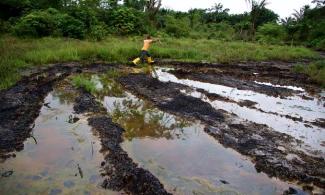
Yearly, an average of 240,000 barrels of crude oil is spilled in the Niger Delta due to unknown causes (31.85 per cent), third party activity (20.74 per cent), and mechanical failure (17.04 per cent).

More than 24 years after prominent environmental rights activist and writer, Ken Saro-Wiwa, was killed by the military regime in Nigeria for his efforts in drawing attention to the pollution by multinational oil companies in the Niger Delta region, activities in the area have continued to degrade the environment.
Yearly, an average of 240,000 barrels of crude oil is spilled in the Niger Delta due to unknown causes (31.85 per cent), third party activity (20.74 per cent), and mechanical failure (17.04 per cent).
Active oil spillage which has continued and is threatening the lives of about 20 million inhabitants of the region which covers 20,000 km within wetlands of 70,000 km formed primarily by sediment deposition.
The estimation by the Nigeria's Department of Petroleum Resources, which puts the total depletion of oil reserves in the country to 49 years from 2019 can cause the region to experience a loss of 40 per cent of its inhabitable terrain in the next 30 years, research shows.
John Udoh, an academic researcher in the area, attributes the continued pollution of the Niger Delta to corruption and gross mismanagement.
“I have worked here for 20 years, collecting samples and analysing to track the level and impact of degradation and I can tell you that every time I go into the creeks and wetlands, the only thing that is on my mind is how greed and lack of foresight has kept this region on the same spot for 50 years.
“There is nothing that stops the Nigerian Government from diversifying the economy and switching to cleaner alternatives but because they collect kickbacks from the multinationals and it is easier money than renewables, they do it with consideration for posterity.
“Oil is a quick fix, an executive at one of these companies once told me in a friendly chat that he will expose the corruption of any official who attempts to stop their operations; you can see that our leaders are not honest or wanting change,” he said.
In 2016, the Nigerian Government announced that it had set up the Hydrocarbon Pollution and Remediation Program to clean up Ogoni land, one of the most polluted areas in the region. Around $187m was set aside for this project. Despite this effort, the pollution in most states in the region continues.
In Port Harcourt, Rivers State, there is an ever present grey cloud, which eventually blackens white walls, floors and even some people's lives forever.
“It started to be more noticeable around 2015, you would sneeze and the contents of the handkerchief would be black.
“We knew the soot was coming from seized crude that government was burning but what I personally did not know was that it would give me shortness of breath and asthma,” says Anthonia Amos, a local fruit vendor in the city.
She feels betrayed and blames government for her condition.
“If they know it was going to be this bad for us, why are they still doing it? All my profit from selling goes to buying inhalers and I am not the only one,” she adds.
Research by Best Ordinioha and Seiyefa Brisibe show that health hazards created by oil exploration and exploitation are covert and slow in action.
Oil spills contaminate the surface water, ground water, ambient air and crops with hydrocarbons, including known carcinogens like polycyclic aromatic hydrocarbon and benxo (a) pyrene, naturally occurring radioactive materials and trace metals that were further bioaccumulated in some food crops. This could lead to a 60 per cent reduction in household food security and capable of reducing the ascorbic acid content of vegetables by as much as 36 per cent and the crude protein content of cassava by 40 per cent. These could result in a 24 per cent increase in the prevalence of childhood malnutrition, the research suggest.
The damage is immeasurable. However, there is still time to act; the switch to cleaner alternatives can help the region recover while creating new and innovative jobs for locals in the area. But this requires the will to act and follow through, says Bibiye Cracker, an activist in the area.
“The damage has happened and continues and at this point there is no going back but there can be a turnaround with action backed by political will and finances.
“Give the people the support of your will and everything else will follow,” he said.
This article was written with the support of Climatetracker.org as part of the 2019 Climate Tracker Data Journalism Fellowship